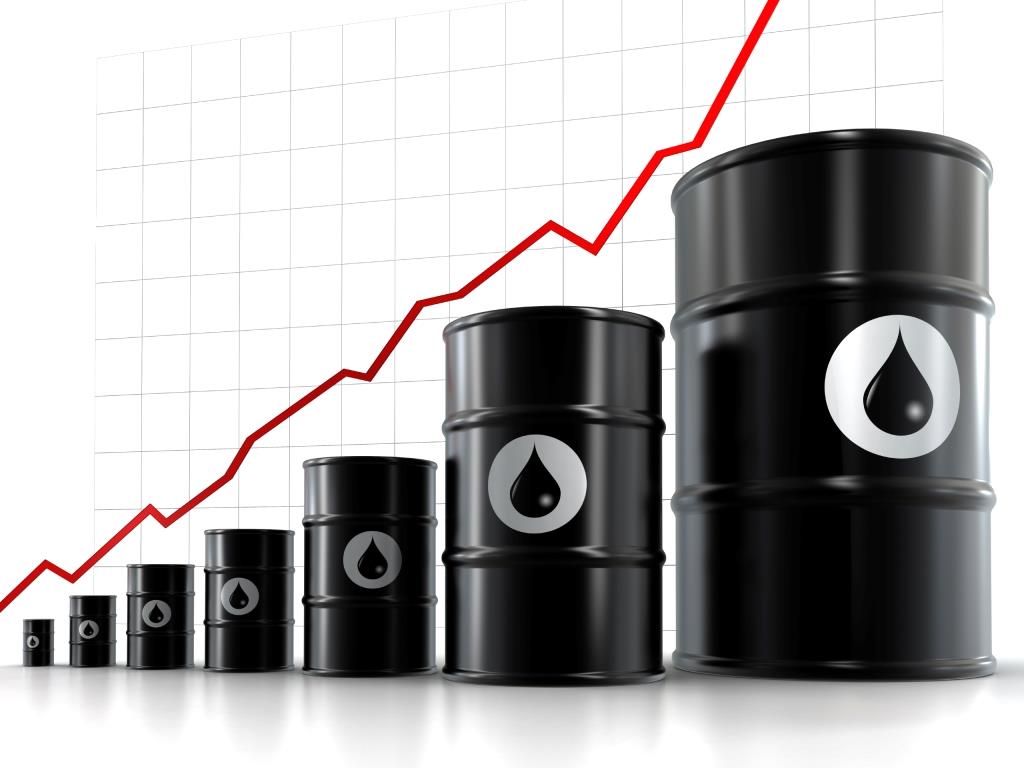Economy
Oil Prices Jump 5% as Ship Blockage Disrupts Crude Flows

By Adedapo Adesanya
Oil prices surged more than 5 per cent on Wednesday as investors assessed the impact on global crude flows after a large ship ran aground and blocked the Suez Canal, threatening supply.
Yesterday, the price of the Brent crude futures moved up by $3.33 or 5.49 per cent to trade at $64.13 per barrel, while the West Texas Intermediate (WTI) crude futures went up by 5.35 per cent or $3.10 to $60.85 per barrel.
From the day’s outcome, it is certain that the disruption in crude flows caused by the Suez Canal blockade in Egypt is pushing the value of the commodity higher.
The pathway is frequently used by tankers transporting crude from the world’s top exporters in the Middle East to customers across Europe and the United States, and also by ships moving cargoes from the North Sea to Asia.
The 400-meter long container ship called Ever Given was tipped by strong winds and it went length-ways across the canal on Tuesday, causing a gridlock of at least 100 vessels.
As many as 10 crude tankers carrying around 13 million barrels of oil could be affected by the disrupted traffic in the canal.
Prices also gained on Wednesday even as the crude oil inventories went up by 1.9 million barrels in the week to March 19, according to a report by the Energy Information Administration (EIA).
The agency added that at 502.7 million barrels, inventories were 6 per cent above the five-year average for this time of year.
The figure compares with a build of 13.8 million barrels reported for the previous week. Analysts had expected the EIA to report an inventory decline of some 900,000 barrels.
A day earlier, the American Petroleum Institute (API) reported a crude oil inventory build of 2.927 million barrels for last week.
Oil prices had declined by more than 10 per cent this week as Europe battles yet another rise in COVID-19 infections and several EU states have started tightening movement restrictions soon after they relaxed them in anticipation of a steady decline in infections.
Coronavirus infections have been surging in some parts of Europe in recent weeks as countries scramble to vaccinate their populations despite delays in rolling out jabs.
Economy
Naira Trades N1,533/$1 at Official Market, N1,650/$1 at Parallel Market

By Adedapo Adesanya
The Naira appreciated further against the United States Dollar at the Nigerian Autonomous Foreign Exchange Market (NAFEM) by N1.50 or 0.09 per cent to close at N1,533.00/$1 on Friday, December 13 versus the N1,534.50/$1 it was transacted on Thursday.
The local currency has continued to benefit from the Electronic Foreign Exchange Matching System (EFEMS) introduced by the Central Bank of Nigeria (CBN) this month.
The implementation of the forex system comes with diverse implications for all segments of the financial markets that deal with FX, including the rebound in the value of the Naira across markets.
The system instantly reflects data on all FX transactions conducted in the interbank market and approved by the CBN.
Market analysts say the publication of real-time prices and buy-sell orders data from this system has lent support to the Naira in the official market and tackled speculation.
In the official market yesterday, the domestic currency improved its value against the Pound Sterling by N12.58 to wrap the session at N1,942.19/£1 compared with the previous day’s N1,954.77/£1 and against the Euro, it gained N2.44 to close at N1,612.85/€1 versus Thursday’s closing price of N1,610.41/€1.
At the black market, the Nigerian Naira appreciated against the greenback on Friday by N30 to sell for N1,650/$1 compared with the preceding session’s value of N1,680/$1.
Meanwhile, the cryptocurrency market was largely positive as investors banked on recent signals, including fresh support from US President-elect, Mr Donald Trump, as well as interest rate cuts by the European Central Bank (ECB).
Ripple (XRP) added 7.3 per cent to sell at $2.49, Binance Coin (BNB) rose by 3.5 per cent to $728.28, Cardano (ADA) expanded by 2.4 per cent to trade at $1.11, Litecoin (LTC) increased by 2.3 per cent to $122.56, Bitcoin (BTC) gained 1.9 per cent to settle at $101,766.17, Dogecoin (DOGE) jumped by 1.2 per cent to $0.4064, Solana (SOL) soared by 0.7 per cent to $226.15 and Ethereum (ETH) advanced by 0.6 per cent to $3,925.35, while the US Dollar Tether (USDT) and the US Dollar Coin (USDC) remained unchanged at $1.00 each.
Economy
Index Gains 0.63% as Value of Nigerian Exchange Crosses N60trn

By Dipo Olowookere
For the fourth consecutive trading session, the Nigerian Exchange (NGX) Limited closed higher on Friday by 0.63 per cent on sustained renewed buying pressure.
Apart from the energy and industrial goods sectors which closed flat, every other sector ended in the green territory, according to data obtained from the bourse.
Business Post reports that the insurance index appreciated by 1.52 per cent, the banking space improved by 0.63 per cent, and the consumer goods counter expanded by 0.46 per cent.
As a result, the All-Share Index (ASI) gained 617.47 points to settle at 99,378.06 points compared with the preceding day’s 98,760.59 points and the market capitalisation went up by 375 billion to close at N60.242 trillion, in contrast to Thursday’s closing value of N59.867 trillion.
The volume of transactions on Customs Street yesterday grew by 11.13 per cent to 544.2 million shares from the 489.7 million shares transacted a day earlier.
The value of transactions increased during the session by 49.30 per cent to N10.6 billion from N7.1 billion and the number of deals went up by 1.93 per cent to 8,464 deals from the 8,304 deals posted in the previous trading session.
The busiest equity for the trading day was Japaul with the sale of 71.7 million units valued at N158.0 million, eTranzact exchanged 70.7 million units worth N477.5 million, Tantalizers sold 57.3 million units for N101.2 million, FCMB traded 33.0 million units worth N297.3 million, and Universal Insurance transacted 27.1 million units valued at N9.6 million.
A total of 36 stocks ended on the gainers’ chart, while 15 stocks finished on the losers’ table, indicating a positive market breadth index and strong investor sentiment.
The trio of Aradel Holdings, Ikeja Hotel and Caverton gained 10.00 per cent each to trade at N550.00, N8.80, and N1.98, respectively, as Africa Prudential rose by 9.87 per cent to N17.25 and Golden Guinea Breweries soared by 9.64 per cent to N8.64.
On the flip side, Austin Laz lost 10.00 per cent to close at N1.62, ABC Transport crashed by 8.00 per cent to N1.15, Royal Exchange slumped by 7.69 per cent to 60 Kobo, Secure Electronic Technology plunged by 5.26 per cent to 54 Kobo, and The Initiates crumbled by 4.26 per cent to N2.25.
Economy
Oil Jumps on Fresh Sanctions Amid Ease in Interest Rates, Demand Boost

By Adedapo Adesanya
Oil climbed by about 2 per cent on Friday on expectations that additional sanctions on Russia and Iran could tighten supplies and that lower interest rates in Europe and the US could boost fuel demand.
Brent futures went up by $1.08 or 1.5 per cent to settle at $74.49 a barrel and the US West Texas Intermediate (WTI) futures expanded by $1.27 or 1.8 per cent to close at $71.29 per barrel.
European Union ambassadors agreed to impose a 15th package of sanctions on Russia this week over its war against Ukraine, targeting its shadow tanker fleet.
The sanctions would target vessels from third countries supporting Russia’s war in Ukraine and add more individuals and entities to the sanctions list.
The sanctions package is likely to be formally adopted at a meeting of EU foreign ministers on Monday and will target close to 30 entities, over 50 individuals and 45 tankers.
Also, the US is considering similar moves that might target some Russian oil exports, before Donald Trump returns to the White House.
Britain, France and Germany told the United Nations Security Council they were ready if necessary to trigger a so-called “snap back” of all international sanctions on Iran to prevent the country from acquiring nuclear weapons.
The move comes as Iran has suffered a series of strategic setbacks, including Israel’s assault on Tehran’s proxy militias Hamas in Gaza and Hezbollah in Lebanon and the ouster of Iranian ally Bashar al-Assad in Syria.
Meanwhile, data from China this week showed that crude imports in the world’s top importer grew annually in November for the first time in seven months.
There are expectations that China’s crude imports will remain elevated into early 2025 as refiners opt to lift more supply from top exporter Saudi Arabia, drawn by lower prices, while independent refiners rush to use their quota.
The International Energy Agency (IEA) increased its forecast for 2025 global oil demand growth to 1.1 million barrels per day from 990,000 barrels per day last month, citing China’s stimulus measures.
The Paris-based energy watchdog forecast an oil surplus for next year, when nations not in the Organisation of the Petroleum Exporting Countries (OPEC) and allies, OPEC+ group, are set to boost supply by about 1.5 million barrels per day, driven by Argentina, Brazil, Canada, Guyana and the US.
The United Arab Emirates (UAE), an OPEC member, plans to reduce oil shipments early next year as OPEC+ seeks tighter discipline.
-

 Feature/OPED5 years ago
Feature/OPED5 years agoDavos was Different this year
-
Travel/Tourism8 years ago
Lagos Seals Western Lodge Hotel In Ikorodu
-

 Showbiz2 years ago
Showbiz2 years agoEstranged Lover Releases Videos of Empress Njamah Bathing
-

 Banking6 years ago
Banking6 years agoSort Codes of GTBank Branches in Nigeria
-

 Economy2 years ago
Economy2 years agoSubsidy Removal: CNG at N130 Per Litre Cheaper Than Petrol—IPMAN
-

 Banking2 years ago
Banking2 years agoFirst Bank Announces Planned Downtime
-

 Sports2 years ago
Sports2 years agoHighest Paid Nigerian Footballer – How Much Do Nigerian Footballers Earn
-

 Technology4 years ago
Technology4 years agoHow To Link Your MTN, Airtel, Glo, 9mobile Lines to NIN












